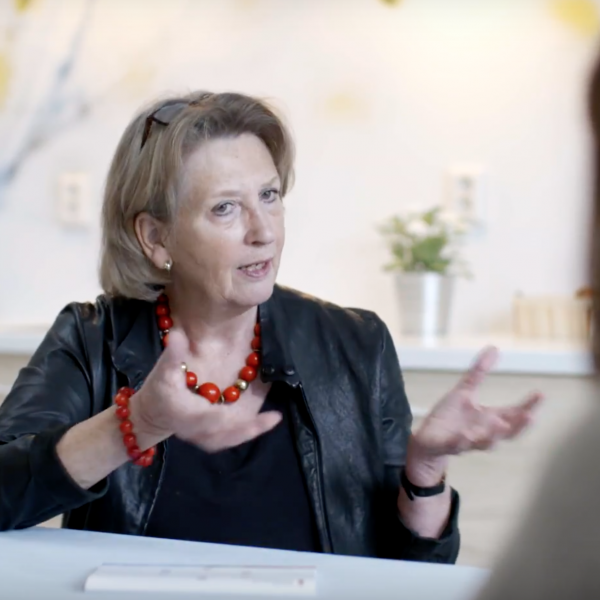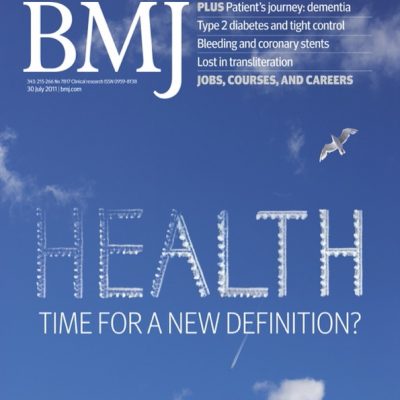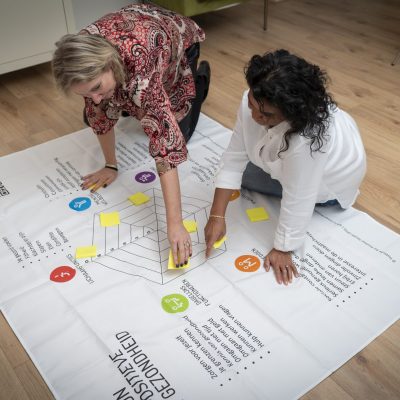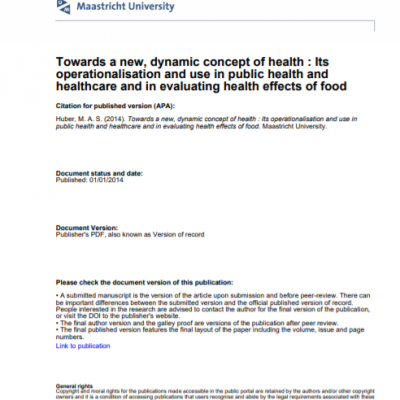About Machteld Huber
Machteld Huber is the founder of the Positive Health philosophy. She was originally a general practitioner. During her own experience with illness, early in her career, she discovered that her experience as a patient went far beyond what she had ever learned as a doctor. She experienced that she could actively and positively influence her recovery and in order to test her suspicions she later started working with seriously damaged people. She also decided to become a researcher at the Louis Bolk Institute in Driebergen, with the goal of putting ‘health promotion’ on the map.
At this multidisciplinary institute Machteld saw many studies on sustainable agriculture and her interest was aroused in the question of whether sustainably grown products would also be healthier as food. She realised the complexity of this question and, in coordination with other scientists, prepared an in-depth study of the effects on the immune system of chickens on the way to research in humans. In 2005, then-Minister of Agriculture Cees Veerman decided to finance this project, together with Rabobank and Triodos Bank. During almost 2 years TNO, Wageningen University and Institute Rikilt worked together with Machteld as project leader on this research. When the project was nearing completion, the initial conclusions, namely that there were indications that organically fed animals were healthier, had to be retracted and amended. This was ordered by the management of some partner institutes. Machteld had to report to the then Minister of Agriculture, Gerda Verburg, that they ‘could not draw any conclusions’. Follow-up research was therefore not carried out.

As the argument for changing conclusions was ‘that there is no working definition of health’, Machteld then focused her work on the definition of health. She developed, together with the Health Council of the Netherlands and ZonMw, a new, dynamic concept of health, based on resilience, functioning and self-governance. She then investigated the support for this concept in the field of care, prevention and in society. She found a big difference in thinking about ‘health’ between patients and, among others, their therapists. She called the broad vision of patients, with six dimensions of health, ‘Positive Health’. In December 2014, she received her PhD on her work, nutrition and health research, in Maastricht. For her work on ‘health’ she received a ZonMw Pearl in 2012. In 2015 Machteld Huber left the Louis Bolk Institute and founded the Institute for Positive Health, of which she was director until August 2019. Meanwhile Positive Health is taking off in the Netherlands, but also abroad.

Machteld Huber (1951) born in Apeldoorn.
Work
1970-1977 Studied medicine at Utrecht University
1978-1980 Assistant in surgery, gynaecology, internal medicine as part of tropical training
1980-1981 Candidate study philosophy (instead of the tropics) Utrecht University
1982-1983 General Practitioner Training, Free University Amsterdam
1984-1986 Acting general practitioner between periods of illness
1986-1989 Medical treatment coordinator drug therapy centre
1986-2015 Senior researcher health and nutrition Louis Bolk Institute
2004-2005 Doctor in Sinai Centre for war traumas
2012 ZonMw Pearl for new health concept
2014 Promotion at Maastricht University
2015-2019 Director Institute for Positive Health
2019-present Strategic advisor Institute for Positive Health
2013-2017 Member Commission Innovation Care Professions and Courses – Care Institute
2010-present Member of the Scientific Council for Integral Sustainable Agriculture & Nutrition
Awards
2012 – ZonMw Pearl – For the work on the health concept
2015 – Honorable Muntendammer Prize for her dissertation (2014): very promising for insurance medicine, due to innovative character and social scope.
2015 – Chosen as most influential person in Public Health
2016 – OPZIJ-Top 100 – Among the 10 most powerful women in health care
Publications
Relevant publications:
Huber, M., van de Vijver, L.P.L, Parmentier, et al. (2010). Effects of organically and conventionally produced feed on biomarkers of health in a chicken model. British Journal of Nutrition (2010), 103:663-676
Huber, M., Rembialkowska, E., Srednicka, D., et al. (2011). Organic food and impact on human health: Assessing the status quo and prospects of research. NJAS-Wageningen J.Life.Sci 58. 2011.103-109.
Huber, M., Knottnerus, J.A., Green, et al. (2011). How should we define health? BMJ 2011, 343(4163):235-237
Huber, M., van Vliet, M., Giezenberg, M., et al. (2016). Towards a ‘patient-centred’ operationalisation of the new dynamic concept of health: a mixed methods study. BMJOpen 2016;5:e010091
Huber, M. (2014). Towards a new, dynamic concept of health. Its operationalisation and use in public health and healthcare, and in evaluating health effects of food. Thesis Maastricht University 2014. ISBN 978-94-6259-471-5


